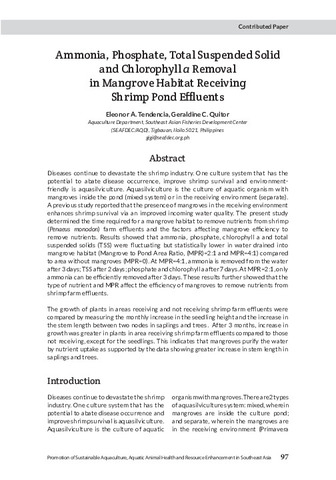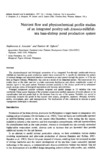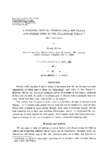Ammonia, phosphate, total suspended solid and chlorophyll a removal in mangrove habitat receiving shrimp pond effluents
| dc.contributor.author | Tendencia, Eleonor | |
| dc.contributor.author | Quitor, Geraldine C. | |
| dc.contributor.editor | Aya, Frolan A. | |
| dc.contributor.editor | de la Peña, Leobert D. | |
| dc.contributor.editor | Salayo, Nerissa D. | |
| dc.contributor.editor | Tendencia, Eleonor A. | |
| dc.date.accessioned | 2021-12-16T02:08:57Z | |
| dc.date.available | 2021-12-16T02:08:57Z | |
| dc.date.issued | 2021-12 | |
| dc.identifier.citation | Tendencia, E. A., & Quitor, G. C. (2021). Ammonia, phosphate, total suspended solid and chlorophyll a removal in mangrove habitat receiving shrimp pond effluents. In F. A. Aya, L. D. de la Peña, N. D. Salayo, & E. A. Tendencia (Eds.), Proceedings of the International Workshop on the Promotion of Sustainable Aquaculture, Aquatic Animal Health, and Resource Enhancement in Southeast Asia (pp. 97–106). Tigbauan, Iloilo, Philippines: Aquaculture Department, Southeast Asian Fisheries Development Center. | en |
| dc.identifier.isbn | 9789719931102 (Print) | |
| dc.identifier.isbn | 9789719931119 (PDF) | |
| dc.identifier.uri | http://hdl.handle.net/10862/6260 | |
| dc.description.abstract | Diseases continue to devastate the shrimp industry. One culture system that has the potential to abate disease occurrence, improve shrimp survival and environmentfriendly is aquasilviculture. Aquasilviculture is the culture of aquatic organism with mangroves inside the pond (mixed system) or in the receiving environment (separate). A previous study reported that the presence of mangroves in the receiving environment enhances shrimp survival via an improved incoming water quality. The present study determined the time required for a mangrove habitat to remove nutrients from shrimp (Penaeus monodon) farm effluents and the factors affecting mangrove efficiency to remove nutrients. Results showed that ammonia, phosphate, chlorophyll a and total suspended solids (TSS) were fluctuating but statistically lower in water drained into mangrove habitat (Mangrove to Pond Area Ratio, (MPR)=2:1 and MPR=4:1) compared to area without mangroves (MPR=0). At MPR=4:1, ammonia is removed from the water after 3 days; TSS after 2 days; phosphate and chlorophyll a after 7 days. At MPR=2:1, only ammonia can be efficiently removed after 3 days. These results further showed that the type of nutrient and MPR affect the efficiency of mangroves to remove nutrients from shrimp farm effluents. The growth of plants in areas receiving and not receiving shrimp farm effluents were compared by measuring the monthly increase in the seedling height and the increase in the stem length between two nodes in saplings and trees. After 3 months, increase in growth was greater in plants in area receiving shrimp farm effluents compared to those not receiving, except for the seedlings. This indicates that mangroves purify the water by nutrient uptake as supported by the data showing greater increase in stem length in saplings and trees. | en |
| dc.description.sponsorship | The study was funded by the Government of Japan under the Trust Fund (GOJ TF 6) granted to SEAFDEC/AQD under study code FS-04-Y2015T. | en |
| dc.language.iso | en | en |
| dc.publisher | Aquaculture Department, Southeast Asian Fisheries Development Center | en |
| dc.rights | Attribution-NonCommercial-ShareAlike 3.0 IGO | * |
| dc.rights.uri | http://creativecommons.org/licenses/by-nc-sa/3.0/igo/ | * |
| dc.subject | prawns and shrimps | en |
| dc.title | Ammonia, phosphate, total suspended solid and chlorophyll a removal in mangrove habitat receiving shrimp pond effluents | en |
| dc.type | Conference paper | en |
| dc.citation.spage | 97 | |
| dc.citation.epage | 106 | |
| dc.citation.conferenceTitle | Proceedings of the International Workshop on the Promotion of Sustainable Aquaculture, Aquatic Animal Health, and Resource Enhancement in Southeast Asia | en |
| dc.subject.asfa | ammonia | en |
| dc.subject.asfa | phosphates | en |
| dc.subject.asfa | chlorophylls | en |
| dc.subject.asfa | mangroves | en |
| dc.subject.asfa | effluents | en |
| dc.subject.asfa | ponds | en |
| dc.subject.asfa | animal diseases | en |
| dc.subject.asfa | aquaculture | en |
| dc.subject.asfa | shrimp culture | en |
このアイテムのファイル
このアイテムは次のコレクションに所属しています
-
Promotion of Sustainable Aquaculture, Aquatic Animal Health, and Resource Enhancement in Southeast Asia (SARSEA) [31]
Proceedings of the International Workshop on the Promotion of Sustainable Aquaculture, Aquatic Animal Health, and Resource Enhancement in Southeast Asia 25–27 June 2019, Iloilo City, Philippines






